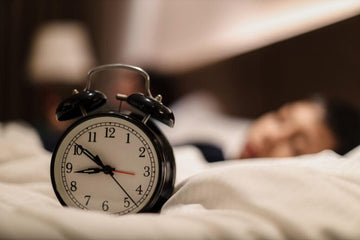Sleep is a crucial factor for overall health and well-being, especially for athletes and fitness enthusiasts looking to build muscle mass. During sleep, the body goes through several important processes that support muscle growth and recovery. Here's the most important information about the relationship between sleep and muscle growth.
Why is sleep important for building muscle?
-
Hormone production:
- During sleep, especially during deep sleep phases, the body produces growth hormones such as human growth hormone (HGH). These hormones play a crucial role in muscle repair and building. Adequate sleep supports the production of these hormones and thus promotes muscle growth.
-
Protein synthesis:
- Sleep promotes protein synthesis, the process by which the body uses proteins to repair and build muscle tissue. During sleep, the rate of protein synthesis increases, which supports muscle repair and growth.
-
Recovery and repair:
- Sleep is the most important recovery period for the body. During sleep, the body repairs and regenerates damaged muscle tissue, which is especially important after intense workouts. Without adequate sleep, the body cannot repair efficiently, which can lead to muscle loss and increased susceptibility to injury.
-
Energy replenishment:
- Sleep helps replenish the body's energy reserves. Restful sleep ensures that glycogen stores in the muscles are replenished, which is important for future training sessions and overall performance.
Effects of lack of sleep on muscle growth
-
Reduced hormone production:
- Lack of sleep can impair the production of growth hormones and testosterone, which negatively affects muscle growth. Low hormone levels can reduce muscle mass and increase recovery time.
-
Increased stress hormone cortisol:
- Lack of sleep increases the production of cortisol, a stress hormone that promotes muscle breakdown and inhibits protein synthesis. High cortisol levels can significantly impair muscle growth and lead to an increase in body fat.
-
Increased risk of injury:
- Without adequate sleep, the body is less able to recover from intense exercise sessions. This can increase the risk of injury and reduce athletic performance.
Tips for better sleep and optimal muscle building
-
Regular sleep rhythm:
- Maintain a regular sleep-wake rhythm by going to bed and getting up at the same time every day. This will help stabilize your internal clock and improve sleep quality.
-
Sleep-friendly environment:
- Create a sleep-friendly environment by keeping your bedroom dark, quiet and cool. Use comfortable mattresses and pillows to maximize sleeping comfort.
-
Avoid stimulants:
- Avoid caffeine and nicotine before bedtime, as these substances can disrupt sleep. Also reduce alcohol consumption, as it can affect sleep quality.
-
Relaxation techniques:
- Practice relaxation techniques such as meditation, deep breathing or gentle yoga before bed to calm the mind and prepare the body for sleep.
-
Balanced diet:
- A balanced diet rich in protein and complex carbohydrates can improve sleep quality and support muscle building. Be sure to consume adequate amounts of micronutrients such as magnesium and zinc, which are important for muscle repair and sleep.





